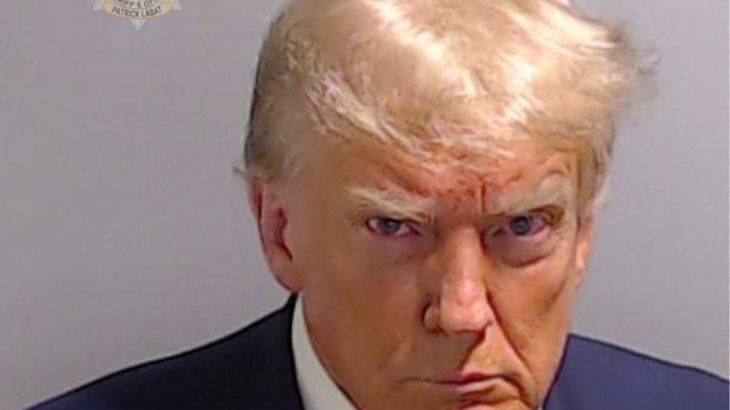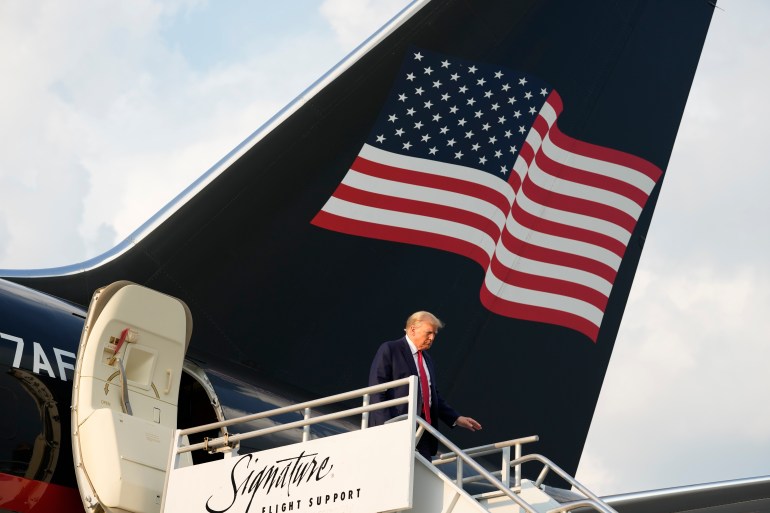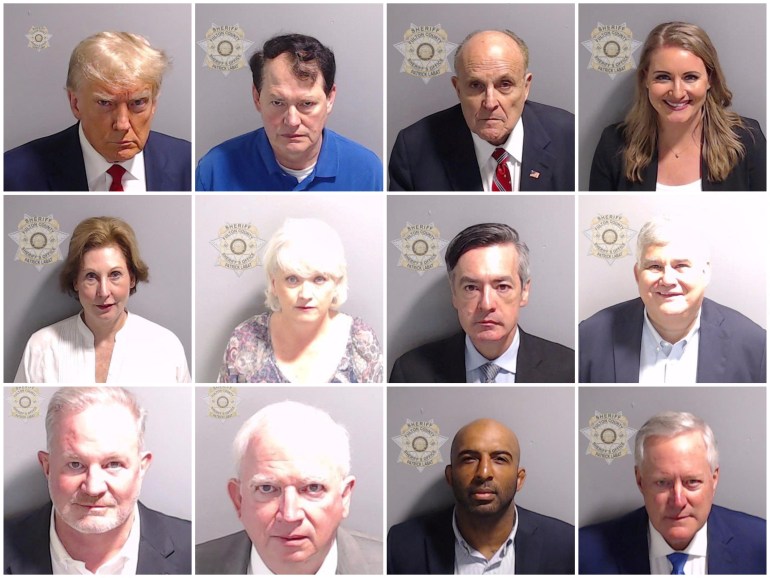Former US President Donald Trump surrenders in Georgia election case
Former US president has turned himself in at the Fulton County Jail in Atlanta, Georgia, to face 2020 election interference charges.

Former United States President Donald Trump has surrendered himself to authorities in the state of Georgia, where he faces criminal charges related to efforts to overturn the 2020 election.
The Republican leader flew down from his residence in Bedminster, New Jersey, to appear at the Fulton County jail on Thursday afternoon, less than a day before his deadline to surrender.
Keep reading
list of 3 itemsTrump to be booked in Georgia election case: Here’s what to expect
Trump will be jailed, the wheel has turned
Once inside, he was swiftly booked, a process that required Trump to have his mugshot taken, a first in US presidential history.
The process took approximately 20 minutes. Afterwards, Trump quickly disappeared into a motorcade waiting outside the jail. He was released on a $200,000 bond agreement, the highest of all his co-defendants.
As he left the airport in Atlanta, Georgia, Trump issued a brief statement to reporters, denying wrongdoing and reiterating that he had the right to challenge his defeat in the 2020 election.
“We have every right – every single right – to challenge an election that we think is dishonest,” Trump said, offering a preview of his defence strategy.
He also turned the allegation of election meddling against the prosecutors, accusing them of trying to derail his 2024 bid for the presidency: “What they’re doing is election interference. They’re trying to interfere with an election.”
Trump is just one of 19 people charged in the Georgia election case, which alleges the existence of a criminal enterprise to override his defeat in the 2020 presidential race.
The former president is believed to be the 12th among the defendants to surrender to authorities.
All 19 defendants faced a deadline of Friday at noon local time (16:00 GMT) to turn themselves in. Since Tuesday, high-profile Trump allies have trickled into the Fulton County jail, including former New York City Mayor Rudy Giuliani and lawyer Sidney Powell.
Debate over trial start date
Ahead of Thursday’s booking, Trump’s lawyers sparred with Georgia prosecutors over when the trial should begin.
One of Trump’s co-defendants, lawyer Ken Chesebro, filed a motion earlier in the day asking for an October 23 start date, a request a Georgia judge granted.
Fani Willis, the Fulton County district attorney prosecuting the case, followed that ruling with her own request to set that date as the start for all 19 defendants.
She had previously suggested beginning the trial in March 2024.
Trump’s legal team, however, responded by filing a motion to sever his case from Chesebro’s, leading to the possibility that multiple trials could take place at separate times.
On his way to the Fulton County jail, Trump once again attacked Willis on social media for what he considered a politically motivated prosecution.
“Please excuse me, I have to start getting ready to head down to Atlanta, Georgia, where Murder and other Violent Crimes have reached levels never seen before, to get ARRESTED by a Radical Left, Lowlife District Attorney, Fani Willis,” Trump wrote on Truth Social.
In a subsequent post, the Republican leader accused Willis of campaigning to “get Trump” as part of her bid for office. She became district attorney in January 2021 and opened an investigation into allegations of election interference the following month.

Protesters gather outside the jail
Trump had announced on social media that he would be arriving at the Fulton County jail around 7:30pm local time (23:30 GMT).
In the hours beforehand, dozens of supporters gathered outside the facility, waving flags and wearing pro-Trump shirts and baseball caps.
Marjorie Taylor Greene, a US representative from Georgia and ardent Trump supporter, joined the group around 6pm local time (22:00 GMT). She told local media that she was standing up against the “weaponised government”, represented by the prosecutor Willis.
“We’re going to make sure that she loses her job,” Taylor Greene said.
A smaller group of counterprotesters also arrived at the Fulton County jail, some of whom identified as members of the group Republicans Against Trump, or RAT. A few of the demonstrators wore giant rat costumes, and another wore a mock prison uniform.
In a break with usual practice, the Fulton County Sheriff’s Office kept media at a distance from the jail’s car park, where reporters often gather to cover arrests. The Federal Aviation Authority likewise closed the airspace over the jail for approximately an hour and a half, in an effort to ensure security.

A swift booking
When Trump did arrive at the jail, his arrest and booking process went swiftly – in part because his lawyers had already hashed out the bond agreement on Monday.
“Normally, people who are arrested have to find a lawyer, get time, make certain that there’s a prosecutor there in the courtroom, be there when the magistrate judge is on hand, and then they have to spend the time hammering out those details,” Al Jazeera correspondent Rosiland Jordan explained.
“Donald Trump and his legal team got rid of the complicated work first,” she continued. “He spent more time flying here, frankly, than he did actually in the jail this evening.”
Booking involves the creation of an arrest record through the collection of fingerprints and personal details for all the defendants.
In the Georgia case, Trump was not spared from having his mugshot taken as he had in his previous three criminal indictments.
Fulton County Sheriff Pat Labat had previously told Atlanta-area media that Trump and his 18 co-defendants would be treated like any other person facing arrest.
“Unless somebody tells me differently, we are following our normal practices, and so it doesn’t matter your status. We’ll have a mugshot ready for you,” Labat explained to the news station WSB-TV.
In many jurisdictions, authorities have discretion over whether to take a booking photo – and previously, in Trump’s case, officials had deemed him recognisable enough not to need one for identification purposes.
Late on Thursday, Trump embraced his Georgia mugshot, using it to announce his return to the social media platform X, formerly known as Twitter. He had not posted since his suspension from the site in January 2021, after his supporters attacked the US Capitol in an attempt to overturn his 2020 election defeat.
“Never surrender!” Trump wrote alongside his booking photo, with a link to his 2024 presidential campaign.

Georgia marks Trump’s fourth indictment
For Trump, the Georgia case marks his fourth indictment, bringing the total number of criminal charges against the former president to 91.
Thirteen of those charges come from the Georgia investigation, which resulted in a wide-ranging, 98-page indictment using the state’s Racketeer Influenced and Corrupt Organizations Act (RICO).
RICO allows prosecutors to prosecute multiple people at the same time for committing separate crimes but working towards a common goal. For that reason, it is commonly deployed against criminal organisations like gangs.
In the case of Trump and his allies, prosecutors focused on their alleged efforts to subvert Georgia’s presidential election results in 2020. Democrat Joe Biden had narrowly won the state, but in the wake of his defeat, Trump proceeded to push state officials to “find” more votes in his favour, according to prosecutors.
His charges include soliciting a public official to violate their oath of office, filing false statements, conspiracy to commit forgery and conspiracy to impersonate a public officer.
Trump calls indictments a ‘travesty’
Trump also faces election interference charges at the federal level.
On August 1, Special Counsel Jack Smith unveiled a streamlined indictment with just four charges, including conspiracy to defraud the government, conspiracy against rights and two counts of conspiracy to obstruct official proceedings.
The indictment detailed false statements Trump made to allegedly spur the Capitol attack on January 6, 2021, as well as pressure campaigns he is accused of leading against public officials.
Trump became the first president to face criminal charges in April, when Manhattan District Attorney Alvin Bragg filed charges of falsifying business records in a case related to hush-money payments during the 2016 presidential race.
And in June, the first federal indictment against Trump arrived, accusing the former president of mishandling classified documents after his departure from office.
Trump has denied all the charges, calling them a “witch hunt” designed to derail his 2024 presidential race. “What has taken place here is a travesty of justice. We did nothing wrong. I did nothing wrong. And everybody knows it,” he said from Georgia on Thursday.
He is currently the frontrunner among the 2024 Republican presidential hopefuls.